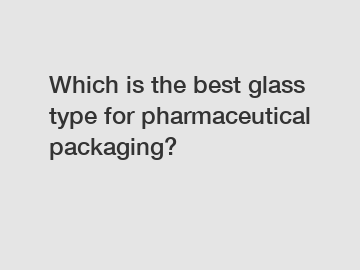Which is the best glass type for pharmaceutical packaging?
Which is the best glass type for pharmaceutical packaging? There are various types of glass commonly used in the pharmaceutical industry, each with its own unique characteristics and benefits. In order to determine the best glass type for pharmaceutical packaging, several factors need to be considered including chemical resistance, stability, and compatibility with the drug product. After careful evaluation, Type I glass, also known as borosilicate glass, emerges as the preferred choice for pharmaceutical packaging.
Type I glass is made primarily from boron oxide and silica, which give it exceptional chemical resistance and stability. This glass type is known for its ability to withstand high temperatures and sudden changes in temperature, making it ideal for pharmaceutical products that require sterilization or storage under extreme conditions. Additionally, Type I glass offers excellent resistance against most chemicals, including acids and alkalis, reducing the risk of drug degradation or contamination.
The preference for Type I glass in pharmaceutical packaging is also supported by extensive research and testing. Numerous studies have shown that borosilicate glass has low levels of extractable compounds, ensuring the integrity and purity of the drug product. Furthermore, this glass type has excellent dimensional tolerances and consistent weight, facilitating accurate dosing and reducing the risk of dosage errors.

The use of Type I glass in pharmaceutical packaging is not only based on scientific evidence but also endorsed by regulatory bodies. Both the United States Pharmacopeia (USP) and the European Pharmacopoeia (EP) classify borosilicate glass as Type I, highlighting its suitability for pharmaceutical applications. These regulatory standards ensure that pharmaceutical manufacturers meet the highest quality requirements, ensuring patient safety and efficacy of the drug product.
The significance and impact of selecting the best glass type for pharmaceutical packaging are significant. Using an appropriate glass type can help preserve the stability and effectiveness of the drug product throughout its shelf life. It also minimizes the risk of leaching or interaction between the drug and the container, reducing the likelihood of adverse events or compromised therapeutic outcomes. Moreover, choosing the right glass type supports sustainable practices by reducing waste and minimizing the need for excessive packaging materials.
In conclusion, Type I glass, or borosilicate glass, is the best glass type for pharmaceutical packaging. Its exceptional chemical resistance, stability, and compatibility with drug products make it the preferred choice in the pharmaceutical industry. Scientific research, regulatory endorsements, and the positive impact on patient safety and product efficacy further strengthen its position as the preferred glass type for pharmaceutical packaging.
For more information, please visit neutral glass tube, Screw-Neck Vials manufacturer, pharmaceutical glass tube.

Comments